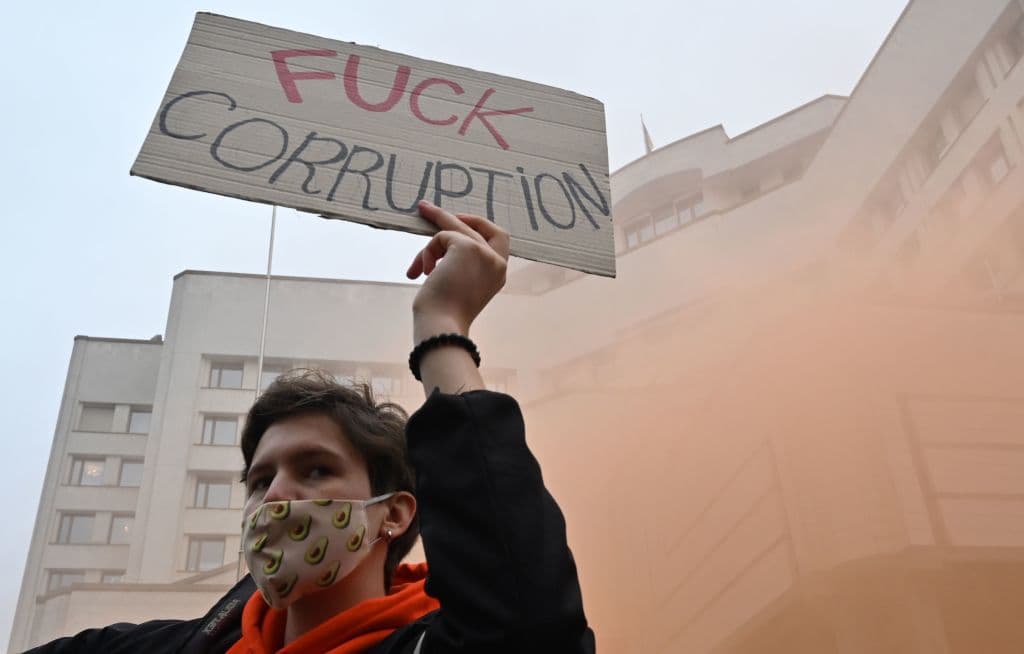Investigative journalists: Judge supported by Western experts may be implicated in corruption

A controversial judge greenlighted by the Ethics Council, the main body tasked with spearheading judicial reforms, may be involved in corruption, according to an investigation by the Slidstvo.info investigative journalism project.
The Ethics Council, which is comprised of both Ukrainian judges and Western experts, has come under fire for greenlighting several tainted candidates and vetoing a well-known whistleblower and anti-corruption crusader. Civic watchdogs have said that, as a result of the Ethics Council’s actions, judicial reform is “on the brink of collapse.”
Olena Zaichko, a judge at the Kharkiv District Administrative Court, was approved by the Ethics Council in June as a candidate for membership in the High Council of Justice, the judiciary’s highest governing body. If the Verkhovna Rada approves her candidacy, she will become a member of the council.
Zaichko did not respond to a request for comment.
Zaichko is suspected of unlawfully reversing her own decision to reject Kharkiv-based businesswoman Maryna Voystryk’s lawsuit seeking to annul her Hr 7.5 million ($200,000) tax debt.
Slidstvo.info has obtained an audio recording in which a person identified by the media outlet as Zaichko asked colleagues to destroy a recording of a court hearing in the tax debt case on July 13, 2020.
“I think I've done something wrong,” Zaichko allegedly said. “I vetoed this but I should have approved it. Can we destroy the hard disk?”
On the next day after the conversation, Zaichko issued a ruling to reverse her own court ruling against Voystryk by allegedly correcting a “misprint.” She replaced "reject the lawsuit" with "uphold the lawsuit."
Read also: Watchdogs say Ukraine’s judicial reform on brink of catastrophe
Controversial ruling
Mykhailo Zhernakov, head of legal think-tank Dejure, told Slidstvo.info that such a “correction” is blatantly unlawful, and corruption may be involved. The High Council of Justice should fire her for that violation, he added.
The destruction of the recording, which Zaichko demanded, was apparently aimed at preventing anyone from hearing whether she said "reject" or "approve" during the actual hearing.
Read also: Investigators destroy case files linked to pro-Kremlin politicians amid Russian invasion
Before Zaichko was approved by the Ethics Council, Dejure, the Anti-Corruption Action Center and anti-corruption watchdog AutoMaidan had analyzed her background and concluded that she did not meet ethics and integrity standards.
In 2020, Zaichko issued a ruling in favor of a firm investigated for alleged unlawful acquisition of land plots in collusion with Kharkiv’s authorities. Immediately after the ruling, her children got an apartment with an area of 102.5 square meters free of charge from the Kharkiv City Hall.
In 2021, she also declared buying a Lexus RX 350 car worth Hr 2 million ($54,000) but did not declare sufficient income to pay for it, the watchdogs said.
Read also: Oleg Sukhov: Ukrainian kleptocrats use war to entrench corruption, with Western experts as facade
Judicial reform fails
The case of Zaichko further deteriorates trust in the previously praised Ethics Council.
In June, Ukraine’s leading anti-corruption watchdogs issued a statement saying that the Ethics Council had undermined trust in the judicial reform by approving tainted candidates for top jobs and vetoing an anti-corruption crusader. The council denied the accusations of wrongdoing.
The watchdogs also lambasted the Ethics Council for destroying transparency. The council has banned broadcasts of its interviews with candidates, citing alleged security risks due to the ongoing Russian invasion.
According to the watchdogs, the Ethics Council’s decisions may lead to “catastrophic” results both for judicial reform and Ukraine’s European integration prospects. Judicial reform is a key requirement for Ukraine’s start of accession talks with the European Union.
Read also: European Commission recommends granting Ukraine candidate status, reforms must follow
The Ethics Council’s task is to select members of the High Council of Justice based on ethics and integrity standards. The High Council of Justice appoints, fires, and punishes judges.
But AutoMaidan, Dejure, and the Anti-Corruption Action Center said that candidates approved by the Ethics Council have violated asset declaration rules, refused to punish numerous judges implicated in corruption, and persecuted whistleblowers and anti-corruption crusaders.
In June, the Ethics Council also vetoed Larysa Golnyk, a judge at Poltava’s Oktyabrsky Court, claiming that she does not meet integrity standards.
Golnyk, Ukraine’s most famous whistleblower judge, has become a symbol of integrity for civil society watchdogs.
The main justification for the veto was a Facebook post in which she criticized her colleagues for failing to hold Oleksandr Strukov, the chairman of the Oktyabrsky Court, responsible for pressuring her. Golnyk has accused Strukov of pressuring and physically assaulting her in connection with her conflict with Oleksandr Mamai, the mayor of Poltava.
In 2015, Golnyk published video footage featuring Mamai pressuring her to close a corruption case against him. She also published footage of his deputy unsuccessfully trying to bribe her in exchange for closing the case.










